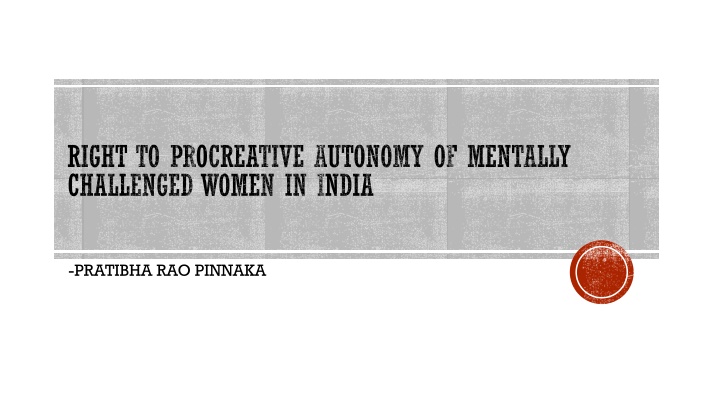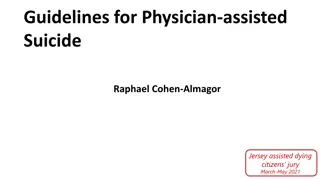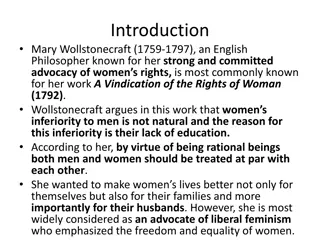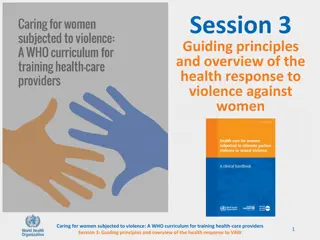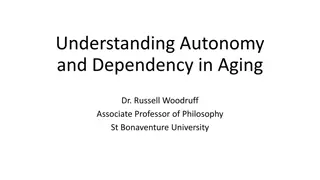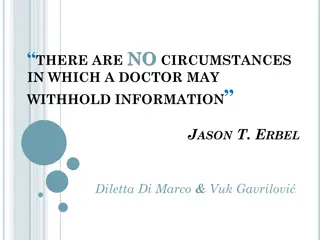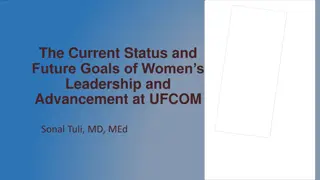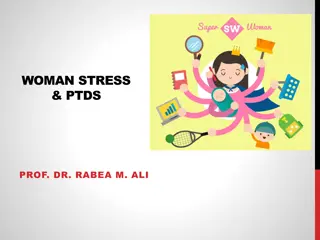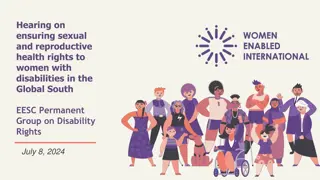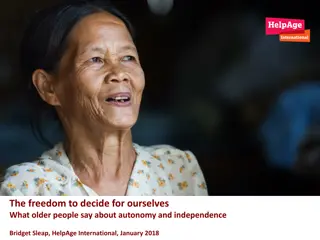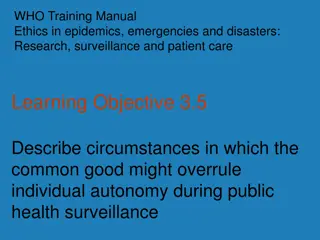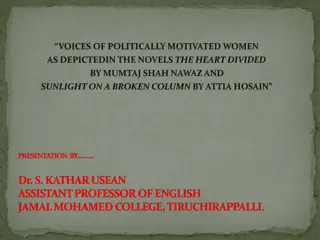Ensuring Procreative Autonomy for Mentally Challenged Women in India
Women's reproductive rights are essential for upholding their human rights, yet the intersection of disabled women's right to reproductive freedom is often overlooked. Despite Indian laws governing reproductive rights, mentally challenged women face significant obstacles. It is crucial to involve these women in decision-making regarding their reproductive health and respect their individual needs. Mental disability should not be a reason to deprive women of their reproductive rights.
Download Presentation

Please find below an Image/Link to download the presentation.
The content on the website is provided AS IS for your information and personal use only. It may not be sold, licensed, or shared on other websites without obtaining consent from the author.If you encounter any issues during the download, it is possible that the publisher has removed the file from their server.
You are allowed to download the files provided on this website for personal or commercial use, subject to the condition that they are used lawfully. All files are the property of their respective owners.
The content on the website is provided AS IS for your information and personal use only. It may not be sold, licensed, or shared on other websites without obtaining consent from the author.
E N D
Presentation Transcript
RIGHT TO PROCREATIVE AUTONOMY OF MENTALLY CHALLENGED WOMEN IN INDIA -PRATIBHA RAO PINNAKA
INTRODUCTION Women s life, liberty, health, autonomy, equality and non-discrimination cannot be ensured without giving them the freedom and authority to determine when they want to have children, sex and complete control over their bodies. The reproductive rights of women are very important to fulfill a wide range of human rights. As the International community moves toward a more robust recognition of both the Human rights of disabled persons and the Reproductive rights of women, the intersection comprising the right of disabled women to reproductive freedom must be given full attention. Laws and policies affecting women s reproductive rights and services when not blatantly discriminatory are often silent where women with disabilities are concerned.
LAWS GOVERNING REPRODUCTIVE RIGHTS IN INDIA Indian Parliament enacted numerous acts and the Union Government with the help of respective State Governments have framed policies in order to ensure women s right to reproductive health. Of the many acts enacted, few of them are Medical Termination of Pregnancy Act, 1971, Maternity Benefit Act, 1961 and Pre- Conception and Pre-Natal Diagnostic Techniques Act, 1994. India has signed and ratified both The Convention on the Elimination of all Forms of Discrimination Against Women (CEDAW) and the United Nations Convention on the Rights of Persons with Disabilities (CRPD).
THE REALITY? Globally women make up three quarters of the disabled people in low and middle income countries and between 65 and 70 percent of those women live in rural areas. Approximately 300 million women around the world have mental and physical disabilities. About 10.3 % of India's population suffers from mental disability. Women with disabilities comprise 10% of all women worldwide, and yet their reproductive health and rights are all too often neglected. The specific needs of women with mental disabilities including developmental disabilities and mental illness pose particularly significant challenges in the human rights context. The government tend to equate mental disability with lack of legal capacity, mental disability requires separate ways of examination.
IS MENTAL DISABILITY A REASON TO DEPRIVE WOMEN OF THEIR REPRODUCTIVE RIGHTS? Women with disabilities are often teased, taunted, looked down upon, and spoken about instead of spoken to, they experience the combined disadvantages associated with gender and disability. Women with mental disabilities should be involved in decision making about their reproductive rights to the fullest extent allowed by their capacities. To the degree that a woman can give her informed consent she is entitled to do so. In extreme cases of mental disability substituted judgment may be appropriate when the individual is emotionally disturbed and ability to give informed consent is lost. If it has been determined that a woman has no ability to consent, those making reproductive decisions on her behalf must respect her individual needs as paramount.
Any action which limits her reproductive rights must be as minimal as possible and not based on the convenience of other. The diagnosis of mental disability should never start with an presumption of in completeness and an assignment of decision making authority to another party. While not binding in the same way as treaties, these consensus documents are evidence of states acknowledgement that they must take specific measures to ensure that reproductive rights are protected,respected and fulfilled. Persons with disabilities must not be denied the opportunity to experience parenthood. Taking into account that persons with disabilities may experience difficulties in getting married and setting up a family. The States should encourage the availability of appropriate counselling.
Violence in all its facets remains a serious area of concern for Women with Disabilities, both as an individual experience and a structural reality that systematically oppresses them in all areas of life. CRPD recognises the issue of violence and provides for protection from torture, ill- treatment, exploitation, abuse and violence under Articles 15 and 16. Institutions in relation to women and girls with disabilities includes mental health facilities. Violence in these institutions can range from chaining, filthy living conditions, physical abuse and sexual violence which are often repetitive in nature. However, there is no response to the problem of systemic violence of this sort. Additionally, provisions for monitoring remain almost unimplemented.
For example, as per the Mental Health Act of 1987, the only penalty for private run institutions is revocation of license, which can be renewed after payment of fine and improvements suggested by the authority. This is the reason for increased number of sexual violence in these institutions. Thus, state responsibility and accountability of personnel becomes even less in institutions run by private entities. Sexual violence within mental hospitals still is a largely unaddressed area apart from the other forms of mental and physical violence that is experienced by the women housed therein. Moreover, the insensitivity of officials, staff of institutions and carers towards issues of abuse only compounds the problem.
CASES OF SEXUAL ASSAULTS IN WEST BENGAL 1 06.04.2011 Pavlov Mental Hospital Attempt to sexual assault of a female resident by a Group D staff. The Group D staff was suspended. An enquiry committee was formed. No reports were shared 2 23.04.2012 Pavlov Mental Hospital Sexual assault of a female resident by kitchen staff No reports found. 3 17.09.2012 Lumbini Park Mental Hospital A female patient was The Group D staff was suspended. An enquiry committee was formed. No reports were shared. sexually assaulted by a male Group D staff.
ROAD AHEAD??? SUCHITA SRIVASTAVA & ANR VS CHANDIGARH ADMINISTRATION In 2009, a mentally challenged woman, inmate of Nari Niketan was found pregnant. At that time she was residing in Ashreya, a home for mentally disturbed persons in Sector 47 and had shifted there only a month ago from Nari Niketan in Sector 26. The police had said the victim was raped during her stay in Nari Niketan in March 2009 and they had collected DNA samples of all employees of Nari Niketan as well as Ashreya. The police had said there was a nexus between employees of Nari Niketan and Ashreya and that the victim was raped repeatedly. The Chandigarh administration then filed a P.I.L. to terminate the pregnancy on the strength of an opinion from a medical board which diagnosed her to be mildly mentally retarded and that the concept of motherhood was beyond her understanding and stated there were apprehensions of complications during the pregnancy.
When doubts were expressed regarding the stability, a new medical board was constituted to analyse the girl s ability to bear a child. The girl was then diagnosed as having mild to moderate mental retardation. She was capable to do her daily activities and understood that she was carrying a child and was looking forward to it. The expert body suggested that she needed a congenial environment and support as her mental capacity was limited and felt that any decision to terminate the pregnancy should be on a holistic approach and so did not recommend an immediate termination. Surprisingly though, the High Court ruled for immediate termination of the pregnancy. The High Court, side lining the report of the expert body, adopted parens patriae approach and directed abortion even when she had been pregnant for about nineteen weeks by then.
The case did not conform to the requirements of the M.T.P. Act which clearly states that the decision to terminate a pregnancy rests with the mother. The requirement of guardian s consent is not applicable in this case as the M.T.P. Act itself differentiates and excludes mentally retarded persons from the category of mental illness. In this case the mother was strongly against abortion. The High Court ignored the spirit behind the M.T.P. Act and the National Trust Act and never even mentioned U.N.C.R.P.D., which clearly states the reproductive right of a person with disability. The case moved to the Supreme Court, the SC overruled the High Court s verdict and allowed the woman to continue pregnancy. It concluded by saying that the victim's pregnancy cannot be terminated without her consent and proceeding with the same would not have served her `best interests .
The MTP Act clearly respects the personal autonomy of mentally retarded persons who are above the age of majority. Since none of the other statutory conditions have been met in this case, termination of pregnancy cannot occur. The court also reasoned that abortion at such a late stage (19-20 weeks of gestation period) poses, significant risks to the physical health of the victim. Lastly, the court looked into the aspect of victim s mental capacity to cope with the demands of carrying the pregnancy to it s full term, however the court said that the National Trust for the Welfare of Mental Retardation will look after the woman in question as well the child care. The apex court mounted an exception to parens patriae jurisdiction exercised by the High Court, as a power subject to constitutional challenge on the ground of right to privacy. It was held that right to privacy includes within its ambit decisions regarding child birth.
Undoubtedly, the State has a compelling interest in protecting life of an unborn child. To this end, the conditions imposed by the statute must be strictly construed as it is a fundamental human right. This judgment is considered as one of the progressive judgements in the line of procreative autonomy of mentally disabled woman, which has given the woman it s right to abort or bear the child
CONCLUSION Despite legislations being in place, a major chunk of disabled women in India do not have accessibility or counselling for safe abortion. With every decision it renders, a court redefines its role in democracy. In the instant case, it was a guardian of rights. The UN Special Rapporteur on the right to health in his mission to India said that the majority of maternal deaths in India are not recorded. However, after the Shanti Devi case the central government has released an order asking for auditing the maternal deaths at community levels and at medical facilities. Numerous laws are enacted and policies are in place but there is lack of effective implementation and such court orders will ensure that the government is held accountable for enforcement of such policies.
The implementation of procreative autonomy in India is not only dependent on women but on their family and society. The Government of India and the judiciary have been taking steps to ensure that disabled women are provided with quality reproductive health services and there must be sentization among individuals and government while dealing with such issues. A lot has to be done to make sure that reproductive rights is embedded into practice in India, however, steps have been taken to institutionalize the right to reproductive health. It is hoped that the Court will monitor the National Trust, which came forward to take responsibility for the welfare of the petitioner and her child during her lifetime. That will be the ultimate test of the Indian state`s commitment to the overall wellbeing of its citizens with disabilities.
References : Suchita Srivastava & Anr vs Chandigarh Administration, AIR 2010 SC 235. http://censusindia.gov.in/Census_And_You/disabled_population.aspx UNITED NATIONS COVENTION ON THE RIGHTS OF PERSONS WITH DISABILITIES, 2008. The Convention on the Elimination of all Forms of Discrimination Against Women, 1979. Medical Termination of Pregnancy Act, 1971.
